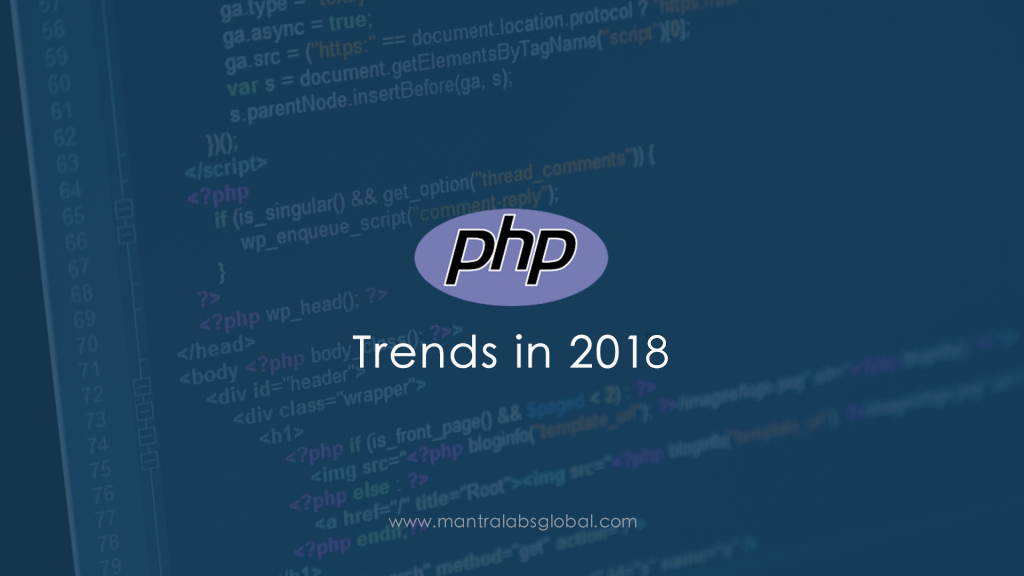PHP is one of the most simple to use the server-side scripting language. PHP frameworks are developed to complement PHP in many ways as they cater a basic structure and enforce the developers to use coding standards and development guidelines to stabilize the product and standardize the process. So this helps to reduce complexity & facilitates developers with all the comfort to focus on their specific areas without affecting the development of other modules.
I have listed down some of the main PHP frameworks which will remain the popular choice for developers in 2018 as well.
Laravel
According to our recent analysis of Google Trends, it can be clearly noticed that Laravel framework stands out & stands above all the frameworks listed and shall stay at the top in 2018. Since 2015’s Sitepoint survey showed that Laravel framework has an excellent documentation, robust features and a growing support community which made Laravel a clear winner in the list of PHP frameworks. Till now with the launch of Laravel 5.5 framework Google Trends has witnessed an increase in Laravel search results across the globe.
One of the most important functionalities of Laravel is the way it handles NoSQL structures like MongoDB & more. It is easy & comfortable for any developer to get started with Laravel because of its excellent documentation. If you are a developer who wishes to work with PHP then it is very useful to become a PHP Laravel developer.
CodeIgniter
This framework, which has more than 11 years, shot to fame thanks to the relatively unassuming use of resources, simplicity, convenience, a huge number of documents, designed for developers of any level, the absence of restrictions. At one time, Laravel is beginning to develop as a competitor CodeIgniter, so that until recently it was a universal benchmark.
- CodeIgniter Reactor great support community, including libraries, modules, templates, and documentation;
- Templates to work with databases, which are very similar to SQL syntax
- The possibility of caching on the server side;
- Using the package manager for quick connection of the libraries from the command line.
Symfony
Symfony has been touted for a while now as a very stable, high performance, well documented, and modular project. Symfony is backed by the French SensioLabs and has been developed by them and its community to be a fantastic framework.
- Symfony defines MVC while many other frameworks try to simply follow MVC rules.
- The standards of Symfony also make it easier to catch errors and to write high-quality code; its community is growing every year.
- Symfony is The leading PHP framework to create websites and web applications
- Laravel uses Symfony
Symfony is used by many big name companies like the BBC and open source project such as Drupal and eZpublish. Symfony was written with stability in mind in a very professional way. Its documentation is extensive, and its community is just as vast. Hence used for building both performances REST APIs, as well as fully fledged web applications.
Yii
Yii is considered as the best framework in a lot of PHP frameworks. This framework facilitates the development of any kind of web app. It is known for being fast & flexible. Yii 2 is easy to install as it utilizes modern technologies & is backed up by the extensive set of features. Moreover, it supports high extensibility with great security & encourages testing. The launch of Yii 2.0 beta has started attracting developers with its new functionalities, features, changes, bug fixes & more. Yii 2 supports PHP 5.3 and some of the functionalities have been inherited from Yii 1.1
CakePHP
Being one of the oldest frameworks CakePHP retains its user base & is gradually but continuously growing. It also has an impressive portfolio comprising of big brands such as Express & BMW. Alike CodeIgnitor, CakePHP is an ideal framework for beginners. It also supports the rapid development of commercial web apps. It has built-in code generation with a scaffolding functionality to increase the speed of development & numerous packages to carry out general functionalities. Configuration process of CakePHP is a breeze as it reduces the need for unwanted complicated files such as XML or YAML config files. Faster builds are one of the main features along with the security features which include measures to prevent cyber-attacks.
ZEND
Zend Framework is prominently known for its go-to professional framework. It is commonly used for powerful enterprise-level applications. It is built with an extensive set of features such as security, extensibility in mind & performance. Zend isn’t ideal for rapid application development as it was developed with a focus on enterprise applications hence it has an enterprise driven nature with the support of numerous components such as feeds, forms, services and more.
Here is the link to know what were the trends in 2017, Latest PHP trends in 2017
Knowledge thats worth delivered in your inbox






